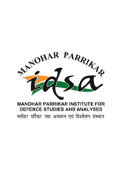China’s Foreign Policy Challenges and Evolving Strategy
The end of the Cold War, the September 11 terrorists’ attacks, preponderance of US power and globalisation have shaped the present world order and posed new opportunities and challenges for China. China’s need to fulfill its grand strategy of acquiring comprehensive national power within this external environment and overcome the existing challenges has given rise to its post-Cold War foreign policy strategy. Given the challenges it faces, its primary need is to ensure continuance of a peaceful environment to sustain its reform and modernisation programme.
- Abanti Bhattacharya
- January 2006






